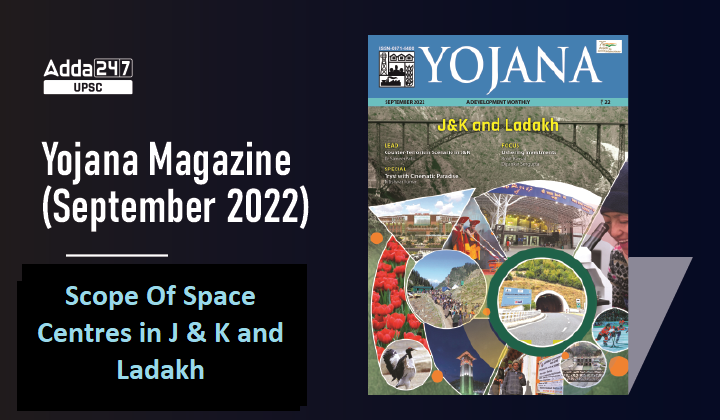Table of Contents
Yojana Magazine is a very important and indispensable source for UPSC Civil Services Exam Preparation. Here, we come with ”Analysis Of Yojana Magazine” which covers the monthly Yojana Magazine keeping in mind the demand of UPSC, particularly from the topics of important government schemes.
In ‘‘Analysis Of Yojana Magazine,” we cover each and every topic of the Yojana edition of a particular month and provide an easy-to-understand gist.
This topic-wise analysis is prepared from the Septeber 2022 edition of the monthly Yojana Magazine.
Scope Of Space Centres in J & K and Ladakh: Introduction
- Astronomers are constantly searching for ideal locations around the world to build their next big telescope based on local meteorological data collected over many years. Such studies are crucial in planning for future observatories and the prediction of how they will vary with time.
- The J & K and Ladakh have the advantages of more clear nights, minimal light pollution, background aerosol concentration, extremely dry atmospheric conditions, etc.
- So, if fully utilized the establishment of Space Infrastructure in this region will open up new vistas in the region for researchers, space scientists, academicians, industrialists and start-ups in the space domain.
Scope Of Space Centres in J & K and Ladakh: Satish Dhawan Centre For Space Sciences
- ISRO, Department of Space and Central University of Jammu (CUJ) had jointly established a space science centre for carrying out research in space science and technology in the Central University campus, Jammu.
- The Centre is named after the renowned Space Scientist, teacher and former Chairman, ISRO, Prof. Satish Dhawan, who hailed from Jammu & Kashmir.
- The centre would enable an extension of ISRO activities in the northernmost region of India.
- The responsibility of managing and maintaining the centre will be posted to the University.
- There would be a museum or public relations section to facilitate knowledge dissemination in the region.
Scope Of Space Centres in J & K and Ladakh: Indian Astronomical Observatory(IAO)
- After examining several years of data of various astroclimatological parameters, IIA had installed the 2-meter aperture Himalayan Chandra Telescope (HCT) at Indian Astronomical Observatory (IAO), Hanle, during 2000.
- Thereafter, due to the uniqueness of this site, several astronomical telescopes operating at optical and infrared wavebands have been installed at Hanle by several Institutes in the country.
- The Indian Astronomical Observatory (IAO) located at Hanle near Leh in Ladakh is becoming one of the promising observatory sites globally.
Scope Of Space Centres in J & K and Ladakh: High Altitude Research Laboratory
- BARC’s Astrophysical Sciences Division operates three facilities around the nation, in Mt. Abu, Srinagar, and Gulmarg.
- The High Altitude Research Laboratory manages a low-energy Neutron Monitor in Gulmarg, situated a few km away from Srinagar.
- At the same time, the Srinagar facility pursues Radiation Application studies and Instrumentation Development activities.
Scope Of Space Centres in J & K and Ladakh: Why Hanle site is declared the most ideal for Space Observation?
- Researchers, in 2021, analysed datasets for the Indian Astronomical Observatory (IAO) in Hanle and Merak (Ladakh), and Devasthal (Nainital) in India, Ali Observatory in the Tibet Autonomous Region in China, South African Large Telescope in South Africa, University of Tokyo Atacama Observatory and Paranal in Chile, and the National Astronomical Observatory in Mexico.
- The team found that the Hanle site which is as dry as Atacama Desert in Chile and much drier than Devasthal and has around 270 clear nights in a year and is also one of the emerging sites for infrared and submillimetre optical astronomy. This is because water vapour absorbs electromagnetic signals and reduces their strength, the DST.
- Night observations at IAO Hanle from 2m-Himalayan Chandra Telescope (HCT) are possible throughout the year without any interruption due to monsoon.
- Due to the advantages of more clear nights, minimal light pollution, background aerosol concentration, extremely dry atmospheric conditions, and uninterrupted monsoon, this region is becoming one of the promising sites globally for the next generation of astronomical observatories.
Scope Of Space Centres in J & K and Ladakh: Conclusion
Space applications cut across all the technology domains, and space will become an unavoidable technology in the years to come in all walks of life and J & K and Ladakh have a prominent role to play in that.



 TSPSC Group 1 Question Paper 2024, Downl...
TSPSC Group 1 Question Paper 2024, Downl...
 TSPSC Group 1 Answer key 2024 Out, Downl...
TSPSC Group 1 Answer key 2024 Out, Downl...
 UPSC Prelims 2024 Question Paper, Downlo...
UPSC Prelims 2024 Question Paper, Downlo...





